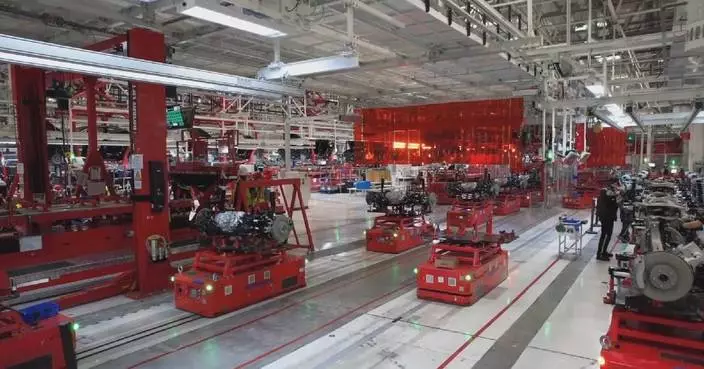A group of young people from Macao are seizing the opportunities brought by integrated development with the Chinese mainland to start their businesses and explore new markets in Hengqin, an island located just across the river from Macao and home to the Guangdong-Macao In-depth Cooperation Zone.
David Cheang, a young entrepreneur from Macao, established his AHA HK and Macao Youth Incubation Center in Hengqin.
With the close proximity between Hengqin and Macao, Cheang commutes between the two places every workday.
The growth of the Guangdong-Hong Kong-Macao Greater Bay Area and the establishment of the Guangdong-Macao In-depth Cooperation Zone in Hengqin allows Macao youths like Cheang to see more entrepreneurial opportunities and promising prospects on the mainland thanks to this integrated economic development.
"Whether you plan to live or start a business here, the Macao affairs center (of the Zhuhai Hengqin New District Administrative Committee) offers one-stop support. A variety of policies are already in place to foster the development of different industries. With Hengqin's business environment increasingly aligned with that of Macao, you'll have access to a vast market here," said Cheang.
Cheang originally worked in finance in Macao. In 2019, following the implementation of the outline development plan for the Guangdong-Hong Kong-Macao Greater Bay Area, he saw opportunities in Hengqin and established an entrepreneurial incubation center there for young people from Hong Kong and Macao who are interested in starting their own businesses.
"The three core elements of 'AHA' are art, happiness, and adventure. We want everyone who comes to us to find their own unique 'AHA' moment. The spirit of taking risks, facing challenges, and being brave is what we need. We share the achievements and joy of 'AHA' with everyone, helping society progress every moment," said Cheang.
As he integrates his business into the Bay Area development, Cheang aims to build a unique incubation center, focusing on development ideas of differentiation and diversity.
"The Outline Development Plan for the Guangdong-Hong Kong-Macao Greater Bay Area in 2019 focuses on differentiated development. Macao is a global center for tourism and leisure, while also serving as a 'base for the coexistence, exchange, and development of diverse cultures', with Chinese culture as the mainstream. This position actually aligns with what we are doing. Our focus for business incubation is in cultural tourism, conventions and exhibitions, trade, and technology, offering a new platform for the suitable diversification of Macao's economy," said Cheang.
Choi, who has worked in the film industry for years in Macao, once faced challenges such as a small local market, limited themes, and a narrow audience.
Now, with the support of Cheang's Hengqin incubation center, Choi and his team benefit from the smooth flow of talent, capital, and information. Through collaboration with mainland counterparts, they are expanding the mainland film and television market and its industrial chain.
In June, they won an award at China's prestigious Golden Rooster and Hundred Flowers Film Festival for a short film they produced with a mainland team about the life of Macao people.
"By working with mainland teams, we create complementary advantages. As we integrate our business into the development of the Greater Bay Area, we gain our country's support, and everyone in our team can freely pursue their dreams and succeed together." said Choi.
Chan, another young entrepreneur from Macao, has moved to Hengqin and opened three restaurants that specialize in Macao's special cuisine there, with the help of the incubation center.
"Since this is my first time starting a business, there's a lot I don't know. The supportive policies and resources for starting a business have helped me solve many questions. I hope to find my place in the growing Hengqin area," said Chan.
So far, Cheang's incubation center has provided services for over 200 companies, more than half of which are from Hong Kong and Macao. Most of these companies are entering the mainland market for the first time.
"I believe the biggest advantage of this era is that, under the 'one country, two systems' policy, Macao can serve as a platform to connect international resources with the opportunities in Hengqin. This has become a successful model in today's environment. We hope our brand will expand across the Greater Bay Area, the whole country, and even the world, which has always been our goal," said Cheang.

Young Macao entrepreneurs explore opportunities in Hengqin special economic district









